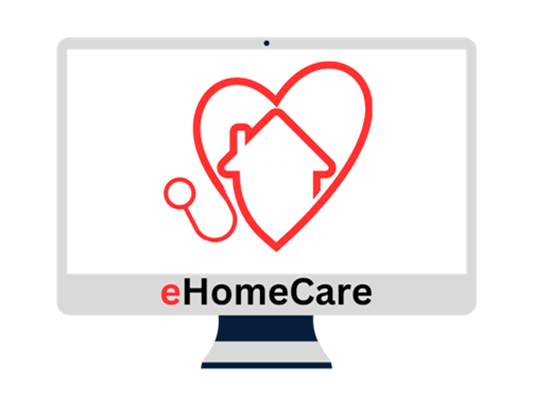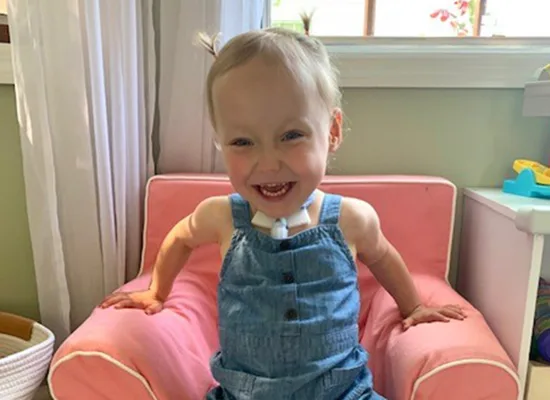Free Virtual Training Program on Caring for Children With Complex Medical Needs at Home

DSCC is proud to sponsor the expanded eHomeCare program to help families and home nurses improve their care knowledge and refresh their skills
We are excited to help expand a free online training program on how to care for children with complex medical needs at home.
Research shows that the number of children in need of medically complex care at home is steadily growing. With this growth, there is an urgent need for current and accessible educational resources to ensure the quality and safety of care for these children.
We’ve also heard from families and home nurses that they need a way to expand their knowledge about care in the home and refresh their skills.
The Division of Specialized Care for Children (DSCC) is proud to sponsor the expanded eHomeCare program to help meet this need and equip caregivers with the tools and knowledge necessary to provide high-quality care.
The eHomeCare program provides comprehensive, evidence-based information on the care of children with complex medical needs at home. The training is for:
- Family members and caregivers of children with complex medical needs
- Nurses working in home-based environments
- Physicians
- Respiratory therapists
- Students from health professions
- Anyone interested in learning more about caring for children with complex medical needs.
The eHomeCare program consists of eight on-demand courses to enhance the knowledge, skills and confidence of home care providers in the following areas:
- Caring for children with a tracheostomy with or without a ventilator
- Central line care
- Dialysis in home
- Infection control
- Setting boundaries in the home
- Skin care
- Range of motion
- Daily care activities for children
The courses aim to bridge knowledge gaps and enhance caregivers’ confidence and competence in managing both routine and emergency situations.
Please note that the completion of these training courses alone is not enough to demonstrate proficiency in skills that require specialized care (such as caring for a trach, ventilator or central line). If you are interested in becoming trained to provide these cares, please talk to your child’s medical team or home nursing agency.
Parents, extended family members, caregivers and others can use these modules to learn and refresh different skills for caring for their medically complex child in the home setting.
To learn more about the courses and enroll, visit the eHomeCare Online Training Program website.
After participating in the eHomeCare courses, individuals will be able to:
- Describe best practices for providing care and managing common issues for children requiring complex medical care at home.
- Recognize signs and symptoms of complications and determine appropriate responses when caring for children requiring complex medical care at home.
- Demonstrate enhanced confidence and competence in providing care for children requiring complex medical care at home.
- Collaborate effectively with healthcare team members to provide comprehensive and coordinated care for children requiring complex medical care at home.
Free continuing education credits are available.
If you have trouble enrolling in the course or need help, please email help@icep.wisc.edu.
The eHomeCare Program originally started as one course focused on trach and vent care through a partnership of several Wisconsin-based nursing schools and hospitals.
DSCC provided funding and collaboration to expand the eHomeCare training program in response to family feedback on the need for more education and training on caring for children with complex medical needs at home.
We partnered with the Illinois Department of Healthcare and Family Services (HFS) and the federal Centers for Medicare and Medicaid Services (CMS) to fund the project.
DSCC team members worked with eHomeCare developer Dr. Kim Whitmore and her team at Ujima United to add more courses to the training in collaboration with the Interprofessional Continuing Education Partnership at the University of Wisconsin-Madison.
We hope the expanded eHomeCare training modules will be a valuable resource for families, caregivers and everyone involved in their children’s complex care at home.
New Training Resources on Caring for Children With Trachs

A new video and an updated free online course are available to help support the care of children with tracheostomy tubes
Parents and caregivers have a lot to learn when their child needs a tracheostomy (trach) tube to breathe.
Our Division of Specialized Care for Children (DSCC) team is here to support and guide families through learning how to care for their children’s complex medical needs.
We’ve gathered two new training resources to help families understand trach care.
Lurie Children’s Hospital Video on How to Handle Trach Emergencies
When emergency situations occur, it’s very important to keep the child’s trach tube open and in place.
Ann and Robert H. Lurie Children’s Hospital of Chicago has developed a video to help parents, caregivers and others know how to handle emergency situations with pediatric trach patients.
In this video, Lurie nurses explain:
- How to prevent and assess emergency situations
- How to manage a mucous plug
- How to replace a trach tube that has become dislodged
- What to do if the trach tube is difficult to replace
- When to provide manual ventilation using bag to trach tube, bag and mask to mouth, and mouth to mouth
We encourage our participant families in the Home Care Program to watch this video. Many of the children and youth in the Home Care Program rely on trachs and ventilators to breathe.
Please note that watching this video alone is not enough training to safely care for a child with a trach. Families should speak with their child’s doctors and care team about any questions or training needs.
For more information on how to safely care for a trach tube, you can visit Lurie’s Tracheostomy Care at Home webpage.
Free eHomeCare Course on How to Care for Children With A Trach
An updated free online course is available on how to care for children with trachs with or without a ventilator.
The eHomeCare program training is for:
- Nurses working in home-based environments
- Physicians
- Respiratory therapists
- Family members and caregivers of children with trachs with and without ventilators
- Students from health professions
The course is available until Sept. 30, 2026.
Learners can use this course for initial training, an annual review or as an ongoing resource.
The course learning objectives are:
- Describe best practices for providing day-to-day care for children with trachs with or without ventilators in the community
- Explain how to manage emergency situations for children with trachs with or without ventilators in the community
- Report an increase in confidence when caring for children with trachs with or without ventilators in the community
- Describe the roles and responsibilities of members of the healthcare team.
Free continuing education credits are available.
If you have trouble enrolling in the course or need help, please email help@icep.wisc.edu.
Again, please note that families should speak with their child’s doctors and care team about any questions or training needs for their child with a trach.
Our participant families can also contact their DSCC Care Coordinator with questions.


